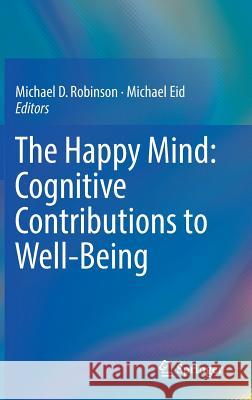The Happy Mind: Cognitive Contributions to Well-Being » książka



The Happy Mind: Cognitive Contributions to Well-Being
ISBN-13: 9783319587615 / Angielski / Twarda / 2017 / 480 str.
The Happy Mind: Cognitive Contributions to Well-Being
ISBN-13: 9783319587615 / Angielski / Twarda / 2017 / 480 str.
(netto: 766,76 VAT: 5%)
Najniższa cena z 30 dni: 771,08
ok. 16-18 dni roboczych.
Darmowa dostawa!
This edited volume focuses on different views of happiness and well-being, considering constructs like meaning and spirituality in addition to the more standard constructs of positive emotion and life satisfaction.
Chapter 1. Introduction; Michael D. Robinson and Michael Eid.- Part I. The Mind.- Chapter 2. Attention, Emotion, and Well-Being: An Adult Lifespan Perspective; Kimberley M. Livingstone and Derek Isaacowitz.- Chapter 3. Autobiographical Memory; Dieter Ferring.- Chapter 4. Mindfulness and Well-being; Hooria Jazaieri and Shauna Shapiro.- Chapter 5. The Quiet Ego: Concept, Measurement, and Well-Being; Heidi A. Waymen and Jack J. Bauer.- Chapter 6. Staying Happier; Megan M. Fritz, Lisa C. Walsh and Sonja Lyubomirsky.- Part II. Positive Cognitions.- Chapter 7. Beyond Hedonic and Eudaimonic Well-Being: Inspiration and the Self-Transcendence Tradition; Will C.M. Belzak, Yoon Young Sim and Lena M. Wadsworth.- Chapter 8. Savoring and Well-Being: Mapping the Cognitive-Emotional Terrain of the Happy Mind; Jennifer L. Smith and Fred B. Bryant.- Chapter 9. Cognitive Aspects of Positive Emotions: A Broader View for Well-Being; Laura G. Kiken and Barbara L. Fredrickson.- Chapter 10. Positive Illusions and the Happy Mind; Astrid Schütz and Roy F. Baumeister.- Chapter 11. Optimism; Suzanne C. Segerstrom, Charles S. Carver and Michael F. Scheier.- Part III. Self-Regulation.- Chapter 12. Perspectives on Studying Perceived Control in the 21st Century; Judith G. Chipperfield, Jeremy M. Hamm, Raymond P. Perry and Joelle C. Ruthig.- Chapter 13. Means, Ends, and Happiness: The Role of Goals for Subjective Well-Being; Marie Hennecke and Veronika Brandstätter.- Chapter 14. Coping, Emotion Regulation, and Well-Being: Intrapersonal and Interpersonal Processes; Brett Marroquín, Howard Tennen and Annette L. Stanton.- Chapter 15. Autobiographical Memory, Self-Regulation, and Well-Being; Dieter Ferring and Isabelle Tournier.- Chapter 16. Self-Affirmation: Protecting the Self and Protecting Subjective Well-Being; Natalie Schüz and Benjamin Schüz.- Part IV. Social Processes.- Chapter 17. Social Comparisons and Well-Being; Abraham P. Buunk and Pieternel Dijkstra.- Chapter 18. Prosocial Behavior and Empathy-Related Responding: Relations to Children’s Well-Being; Tracy L. Spinrad and Nancy Eisenberg.- Chapter 19. On the Road to Social Well-Being; Giulia Weyrich, Alex Zautra and Eva Zautra.- Part V. Meaning.- Chapter 20. The Functionality of Emotional Clarity: A Process-Oriented Approach to Understanding the Relation Between Emotional Clarity and Well-Being; Tanja Lischetzke and Michael Eid.- Chapter 21. Can Affectively Negative Experiences Contribute to Well-Being? The Affectively Negative Need-Fulfillment Model; Jacob Juhl, Clay Routledge and Joshua A. Hicks.- Chapter 22. Making Sense: Meaning in Life in a Cognitive Context; Sarah Ward and Laura King.- Chapter 23. Nostalgia as a Psychological Resource for a Meaningful Life; Andrew A. Abeyta and Clay Routledge.- Chapter 24. Religious Cognitions and Well-Being: A Meaning Perspective; Crystal L. Park.- Chapter 25. Wiser But Not Sadder, Blissful But Not Ignorant: Exploring the Co-Development of Wisdom and Well-Being Over Time; Nic. M. Weststrate and Judith Glück.
This edited volume focuses on different views of happiness and well-being, considering constructs like meaning and spirituality in addition to the more standard constructs of positive emotion and life satisfaction. A premise of the volume is that being happy consists of more than having the right things happen to us; it also depends on how we interpret those events as well as what we are trying to achieve. Such considerations suggest that cognitive-emotional factors should play a fairly pronounced role in how happy we are. The present volume pursues these themes in the context of 25 chapters organized into 5 sections. The first section centers on cognitive variables such as attention and executive function, in addition to mindfulness. The second section considers important sources of positive cognition such as savoring and optimism and the third section focuses on self-regulatory contributions to well-being. Finally, social processes are covered in a fourth section and meaning-related processes are covered in the fifth. What results is a rich and diverse volume centering on the ways in which our minds can help or hinder our aspirations for happiness.
1997-2026 DolnySlask.com Agencja Internetowa
KrainaKsiazek.PL - Księgarnia Internetowa









